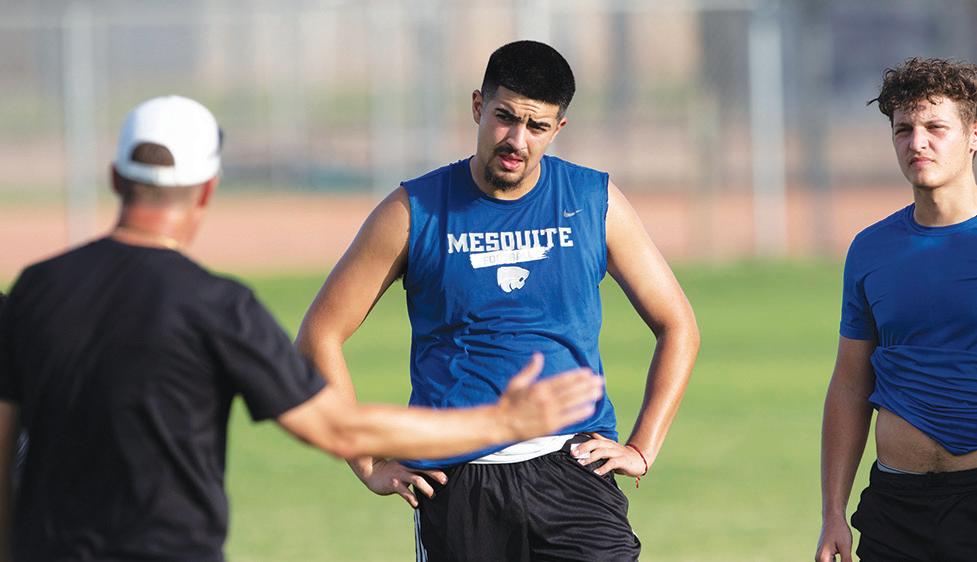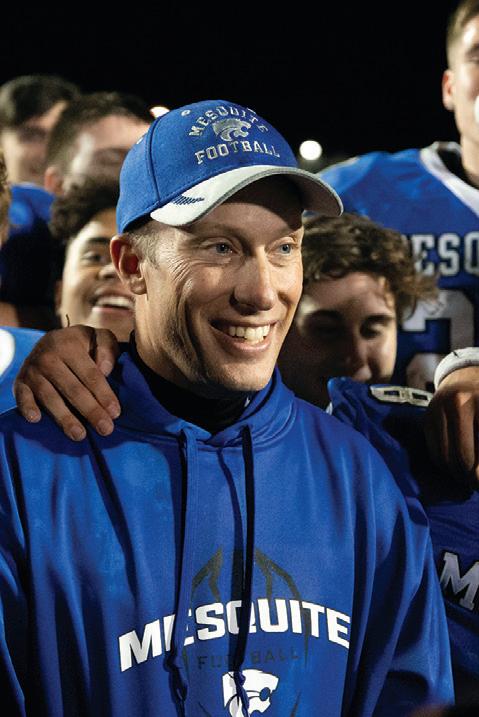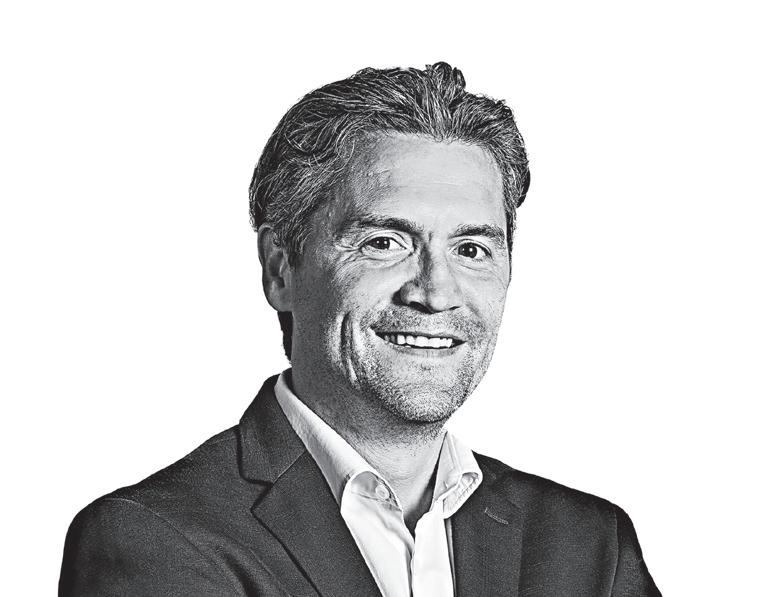
6 minute read
SPORTS
GilbertSunNews.com @GilbertSunNews /GilbertSunNews Check us out and like Gilbert Sun News on Facebook and follow @GilbertSunNews on Twitter Mesquite’s Saenz thrived on and off field
BY ADAM SCHWAGER GSN Contributor Writer
During Mesquite’s Senior Night presentation, the Class of 2022 came out one-by-one as the PA announcer described their post-graduation plans. While most were either attending a two- or four-year college, starting quarterback Gerardo Saenz’ profile stuck out against the rest.
“He plans to become a pipeline welder after high school,” rang out across the field as Saenz came out of the inflatable tunnel with his family.
Throughout his senior year, Saenz has been attending the welding program at the East Valley Institute of Technology (EVIT) after finishing first and second periods. On a typical day, Saenz will wake up at around 5:30 a.m. to get to 6 a.m. practice and attend Mesquite for a couple of hours after practice before heading to EVIT around noon to start welding-specific training. On Mondays, Saenz participates in one hour of classroom instruction where he learns a new concept or weld technique to work on throughout the week. EVIT instructors help future welders work towards their certifications and competencies by giving them hands-on instant feedback, similar to how a football practice is run.
“They won’t tell you a lie. If they think it’s bad, they’ll tell you straight up,” Saenz said. “Them being super straightforward with us really helps us, and just pushes us to work harder and get better welds to try to prove them wrong.”
Saenz dipped his toe in the water with a welding class during his sophomore year of high school but didn’t start fully pursuing the craft immediately.
“(Gerardo started expressing serious interest) this year actually,” Gerardo’s mother Michelle said. “It seems like it’s something he really likes, and he’s really got an interest in, so I think it’ll be great.”
When Gerardo currently goes to welding class, he works hard to continue to improve upon his passion. However, when he first started attending EVIT this semester, things started off a bit rocky.
“He just didn’t want to get engaged, he just didn’t want to start,” team lead welding instructor Willard Deemer said. “I found him hanging out one day in the locker room; just things like that—he didn’t want to do it that day.”
Around the same time, Gerardo was busy on the field trying to replace the top-rated quarterback in Arizona on a team coming off back-to-back 4A state championships.
“Trying to replace him, I have a lot of haters, a lot of doubters saying, ‘we can’t do it,’ even from my own school,” Gerardo said.
A couple of games in, the haters might have had a point. While the Wildcats opened the season 1-1, Gerardo struggled to move a brand-new offense against Cactus and Gilbert. In both games he combined for two touchdown passes and two interceptions on 15-of-38 passing. He only averaged 116 passing yards per game across the first two. But he was able to flip the narrative, leading the Wildcats to the 4A semifinals before falling to Casa Grande.
“As a player I’ve learned more for sure,” Gerardo said. “The more games I’ve played with my teammates, we definitely bonded more, we kind of figured each other out.”
His teammates agree.
“I’m really proud of that guy,” wide receiver Andrew Morris said. “You know it was a rocky start, but every single week he’s gotten better. He’s showed up to practice and he works hard.”
As Gerardo grew as a quarterback, he’s also grew in his welding.
“I don’t know what it was but there was a big change in him all of a sudden,” Deemer said. “He just came in and decided what he really needed to do and figured it out.”
Some of the traits that have helped Gerardo rapidly improve in both his quarterbacking and his welding are his work ethic and his leadership. Much of that work ethic has been built up through not only his football work, but how he’s spent the past three summers.
“I think (his work ethic) is great,” Michelle said. “He’s worked with his dad (doing drywall) over the summer, and he doesn’t whine about it being 115 outside.”
As Gerardo continues to be a captain on the field for Mesquite, he also acts as a leader within his EVIT cohort.
“Some of my friends in here, they come to me and ask for some tips and have me help them with their competencies,” he said.
“For what it is, people will gather around him—good or bad, but we recently have been able to turn that all to the good,” Deemer said. “Now he has a better group around him that are actually all working, so we’re doing much better.”
As Mesquite headed into the 4A playoffs in November, Gerardo’s coach took notice of his quarterback’s improvement and work ethic throughout the season.
“He works incredibly hard,” Mesquite football coach Scott Hare said. “I think right now he’s pursuing to be the best captain he can be, the best player he can be and the best person he can be.”
Mesquite senior Gerardo Saenz thrived this season as quarterback for the Wildcats, leading them to the 4A semifinals while also pursuing a career in welding. (GSN File Photo)

Mesquite coach Scott Hare said he saw constant improvement in Saenz this season and praised him for being a leader for the team.
(Zac BonDurant/GSN Contributor)
PAID ADVERTISEMENT
THE TRANSFORMATIVE POWER OF INCLUSION.

GREGOIRE VERDEAUX
Sr. Vice President, External Affairs, Philip Morris International
At the core of democracy is the duty of policymakers to consider the public’s voice. More than ever, people are demanding to be involved with issues that affect them—from climate change to rebuilding after the pandemic. Experts can no longer tell them “This is too complicated for you to understand.” People around the world are calling for greater action and greater inclusion. And, for the tobacco industry specifically, the need for an ongoing comprehensive and collective review of public opinion and the latest scientific data is critical in transforming the industry for the benefit of adult smokers, their loved ones, and public health.
In fact, according to an international survey conducted by independent research firm Povaddo and commissioned by PMI, a majority of adults surveyed, around seven in 10 (72 percent) support tobacco companies working with governments, regulators, and public health experts to ensure that smokers have access to, and accurate information about, smoke-free alternatives. Support is even higher among current smokers, at 83 percent.*
Transformative collective action occurs when policymakers consider such a clear consensus. But behind this consensus is a simple truth: More inclusive approaches yield more impactful solutions. On any number of global issues, considering experts—and the stakeholders who are most affected—clears a path for progress.
We’re delivering a smoke-free future, faster. Join the conversation at PMI.com/letstalk
*PMI international survey, sample of 29,484 adults. We must not let old ways of working—from behind closed doors and without input from all concerned parties—obscure truths and block more immediate solutions for the world’s over 1 billion smokers. It is not credible for policymakers to simply rely on the static— and sometimes entrenched—views of a few. Decisions must draw from a broader pool of concerned individuals—starting with adult smokers—and rely on the best available science. At Philip Morris International, we strive for transparency as we transform our business by focusing on smoke-free alternatives to replace cigarettes as soon as possible for adults who would otherwise continue smoking—inviting policymakers, the scientific community, and NGOs to review and verify our scientific findings.
By scrutinizing facts and including all voices, we can achieve the well-informed collective action required to solve the many challenges our world is facing. Working together and embracing facts, new technologies, and science is our shared responsibility and the least we can do to drive positive change.
Constructive dialogue builds a better world.




